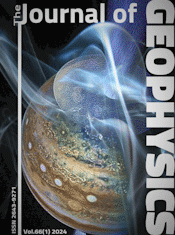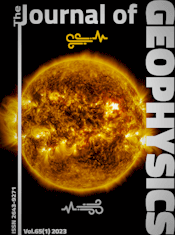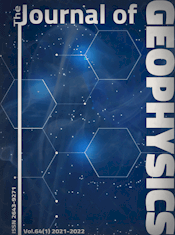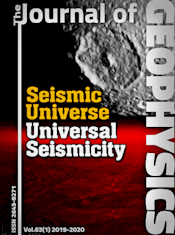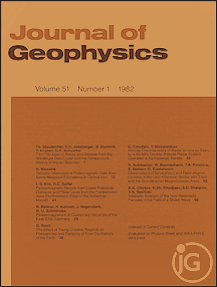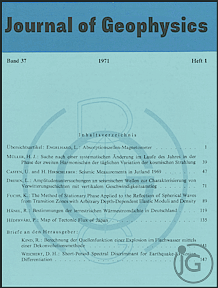The reflectivity method for different source and receiver structures and comparison with GRF data
Article Sidebar
Published:
Dec 19, 1985
Keywords:
Reflectivity method,
Lateral inhomogeneities,
Regional broadband seismograms
Volumes
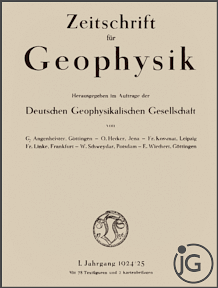
Vols. 1-18 (1924-1944), ISSN 0044-2801
Main Article Content
R. Kind
Seismological Central Observatory, Erlangen Germany
Abstract
A brief review of the reflectivity method is given, including a new analytical solution of the layer matrix equation. The method is extended to allow the computation of complete body waves for different source and receiver structures. Applications of theoretical seismograms to the Grafenberg broadband data are shown. Examples are the detection of depth phases at regional distances in southern Germany, which leads to improved source depth determinations, and the computation of the complete P-wave group for events in ocean-covered areas.
 ARK: https://n2t.net/ark:/88439/y037003
ARK: https://n2t.net/ark:/88439/y037003
Permalink: https://geophysicsjournal.com/article/233
Article Details
How to Cite
Section
References
Brustle, W., Muller, G. (1983) Moment and duration of shallow earthquakes from Love-wave modeling for regional distances. Phys. Earth Planet. Inter. 32:312-324
Chang-Eob Baag, Langston, Ch.A. (1985) A WKBJ spectral method for computation of SV synthetic seismograms in a cylindrically symmetric medium. Geophys. J. R. Astron. Soc. 80:387-417
Dunkin, J.W. (1965) Computation of modal solutions in layered media at high frequencies. Bull. Seismol. Soc. Am. 55 (2):335-358
Engdahl, E.R., Kind, R. (1985) Interpretation of broadband seismograms from central Aleutian earthquakes. Ann. Geophys. (In press)
Fuchs, K. (1968) The reflection of spherical waves from transition zones with arbitrary depth-dependent elastic moduli and density. J. Phys. Earth 16:27-41 (Special Issue)
Fuchs, K., Muller, G. (1971) Computation of synthetic seismograms with the reflectivity method and comparison with observations. Geophys. J. R. Astron. Soc. 23:417-433
Harkrider, D.G. (1964) Surface waves in multilayered elastic media. 1. Rayleigh and Love waves from buried sources in a multilayered elastic halfspace. Bull. Seismol. Soc. Am. 54:627-679
Kennett, B.L.N. (1975) Theoretical seismograms for calculation of laterally varying crustal structures. Geophys. J. R. Astron. Soc. 42:579-589
Kennett, B.L.N. (1983) Seismic wave propagation in stratified media. Cambridge University Press
Kind, R. (1978) The reflectivity method for a buried source. J. Geophys. 44:603-612
Kind, R. (1979a) Extensions of the reflectivity method. J. Geophys. 45:373-380
Kind, R. (1979b) Observations of sPn from Swabian Alb earthquakes at the GRF array. J. Geophys. 45:337-340
Kind, R., Odom, R.I. (1983) Improvements to layer matrix methods. J. Geophys. 53:127-130
Phinney, R.A. (1965) Theoretical calculation of the spectrum of first arrivals in layered elastic mediums. J. Geophys. Res. 20:5107-5123
Schwab, F.A., Knopoff, L. (1972) Fast surface wave and free mode computations. In: Bolt, B.A. (Ed.) Methods in Computational Physics, vol. II. Academic Press, New York
Turnowsky, J., Schneider G. (1982) The seismotectonic character of the September 3, 1978 Swabian Jura earthquake series. Tectonophysics 83:151-162
Zonno, G., Kind, R. (1984) Depth determination of north Italian earthquakes using Grafenberg data. Bull. Seismol. Soc. Am. 74(5):1645-1659
Zurmtihl, R. (1964) Matrizen und ihre technischen Anwendungen. Springer Verlag
Chang-Eob Baag, Langston, Ch.A. (1985) A WKBJ spectral method for computation of SV synthetic seismograms in a cylindrically symmetric medium. Geophys. J. R. Astron. Soc. 80:387-417
Dunkin, J.W. (1965) Computation of modal solutions in layered media at high frequencies. Bull. Seismol. Soc. Am. 55 (2):335-358
Engdahl, E.R., Kind, R. (1985) Interpretation of broadband seismograms from central Aleutian earthquakes. Ann. Geophys. (In press)
Fuchs, K. (1968) The reflection of spherical waves from transition zones with arbitrary depth-dependent elastic moduli and density. J. Phys. Earth 16:27-41 (Special Issue)
Fuchs, K., Muller, G. (1971) Computation of synthetic seismograms with the reflectivity method and comparison with observations. Geophys. J. R. Astron. Soc. 23:417-433
Harkrider, D.G. (1964) Surface waves in multilayered elastic media. 1. Rayleigh and Love waves from buried sources in a multilayered elastic halfspace. Bull. Seismol. Soc. Am. 54:627-679
Kennett, B.L.N. (1975) Theoretical seismograms for calculation of laterally varying crustal structures. Geophys. J. R. Astron. Soc. 42:579-589
Kennett, B.L.N. (1983) Seismic wave propagation in stratified media. Cambridge University Press
Kind, R. (1978) The reflectivity method for a buried source. J. Geophys. 44:603-612
Kind, R. (1979a) Extensions of the reflectivity method. J. Geophys. 45:373-380
Kind, R. (1979b) Observations of sPn from Swabian Alb earthquakes at the GRF array. J. Geophys. 45:337-340
Kind, R., Odom, R.I. (1983) Improvements to layer matrix methods. J. Geophys. 53:127-130
Phinney, R.A. (1965) Theoretical calculation of the spectrum of first arrivals in layered elastic mediums. J. Geophys. Res. 20:5107-5123
Schwab, F.A., Knopoff, L. (1972) Fast surface wave and free mode computations. In: Bolt, B.A. (Ed.) Methods in Computational Physics, vol. II. Academic Press, New York
Turnowsky, J., Schneider G. (1982) The seismotectonic character of the September 3, 1978 Swabian Jura earthquake series. Tectonophysics 83:151-162
Zonno, G., Kind, R. (1984) Depth determination of north Italian earthquakes using Grafenberg data. Bull. Seismol. Soc. Am. 74(5):1645-1659
Zurmtihl, R. (1964) Matrizen und ihre technischen Anwendungen. Springer Verlag



